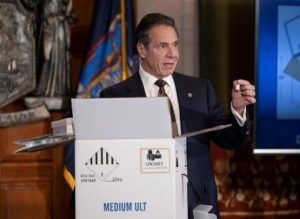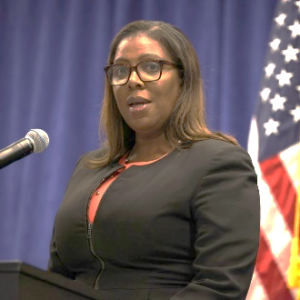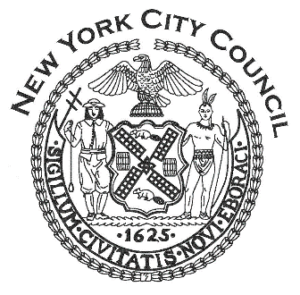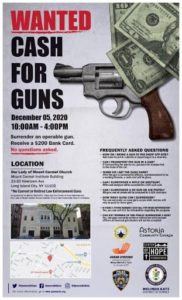In the News – New York State
 NY Readies for COVID-19 Vaccine & Fights Winter Surge
NY Readies for COVID-19 Vaccine & Fights Winter Surge
New York’s war with COVID-19 moved into a new stage this week bringing both hope –a vaccine on the horizon–and stress–surging infection and hospitalization rates–across the State.
Governor Andrew Cuomo announced this week that the first doses of Pfizer’s COVID-19 vaccine will be delivered to New York on December 15th, with enough doses to inoculate 170,000 New Yorkers. An additional batch of Moderna and Pfizer COVID-19 vaccines is expected later in the month. The initial batches are earmarked for the State’s most vulnerable populations, nursing home residents and those living in conjugate settings, and their caregivers, followed by frontline medical workers.
 “It’s [vaccine production] not easy, but it’s real and they’re being manufactured, and they’re going to be shipped, and we’re very proud of Pfizer, we’re very proud of Corning, and we are working very hard to be ready for the distribution and training people on the distribution to make sure it’s all done correctly,” Governor Cuomo said describing Pfizer COVID-19 vaccine packaging, distribution and inoculation process. “But, this is the weapon that is going to win the war, and that is the light at the end of the tunnel, right? So, it’s not tomorrow, it’s not a short tunnel, but we know the way through this. We just have to get there, and we have to get there with as little as loss of life as possible.”
“It’s [vaccine production] not easy, but it’s real and they’re being manufactured, and they’re going to be shipped, and we’re very proud of Pfizer, we’re very proud of Corning, and we are working very hard to be ready for the distribution and training people on the distribution to make sure it’s all done correctly,” Governor Cuomo said describing Pfizer COVID-19 vaccine packaging, distribution and inoculation process. “But, this is the weapon that is going to win the war, and that is the light at the end of the tunnel, right? So, it’s not tomorrow, it’s not a short tunnel, but we know the way through this. We just have to get there, and we have to get there with as little as loss of life as possible.”
Meanwhile, statewide and micro-cluster infection rates are increasing, as are hospitalizations and the number of deaths. The Governor noted that the positive testing rate in all focus areas under the state’s micro-cluster strategy is 5.91 percent, and outside the focus zone areas is 4.49 percent. As of yesterday, hospitalizations totaled almost 4,100 and there were 62 deaths.
To combat the surge, Governor Cuomo announced New York’s Winter plan consisting of five targeted strategies focused on mitigating the spread of the virus and bolstering New York State hospital preparedness including:
- Continue and Strengthen New York’s Targeted Micro-Cluster Strategy while Managing Hospital Capacity to Enhance and Equalize Care.
- Increase and Balance Testing Resources and Availability.
- Keep Schools Open Safely.
- Prevent Viral Spread from Small Gatherings.
- Operationalize an Equitable and Safe Vaccination Program.
According to Governor Cuomo, New York’s contact tracing data shows 70 percent of new COVID-19 cases occur from households and small gatherings. In response, the State has developed a new PSA highlighting the dangers of COVID-19 “living room spread.”
At the height of the pandemic this spring, 19,000 New Yorkers were hospitalized and in April New York reached a daily death rate of over 730.
Governor Cuomo credited New York’s increased testing and advances in COVID-19 treatment plans for reducing the length of hospitalizations as well as significantly reducing the percentage of intubations.
 Attorney General James Announces Rules to Strengthen Investment Professional Oversight
Attorney General James Announces Rules to Strengthen Investment Professional Oversight
New York Attorney General Letitia James this week announced the adoption of rules to strengthen state oversight of the investment advisory industry by modernizing registration and filings with the Investor Protection Bureau (IPB) in the Office of the Attorney General (OAG).
According to the Attorney General, once these changes are fully implemented in 2021, New York’s registration procedures will better conform to the federal securities registration system. The rules will cure industry confusion when it comes to certain registration requirements and better track exam requirement compliance and disciplinary disclosures for investment advisers.
 “These new rules reflect years of hard work by this office to bring securities registration into the 21st century,” said Attorney General James. “By moving to standardized electronic filings and payments, our systems will be more resilient to disruption in the future and will be better equipped to protect investors from frauds…It is more important than ever for New Yorkers to know who they are dealing with when making an investment, and these rules will do exactly that by expanding the registration and tracking of individual investment advisers. Ultimately, this action represents a significant step forward in our efforts to protect New York investors and oversee securities sales practices.”
“These new rules reflect years of hard work by this office to bring securities registration into the 21st century,” said Attorney General James. “By moving to standardized electronic filings and payments, our systems will be more resilient to disruption in the future and will be better equipped to protect investors from frauds…It is more important than ever for New Yorkers to know who they are dealing with when making an investment, and these rules will do exactly that by expanding the registration and tracking of individual investment advisers. Ultimately, this action represents a significant step forward in our efforts to protect New York investors and oversee securities sales practices.”
The first rule moves required notice filings for federal “covered securities” being sold in New York to the electronic filing depository system for the North American Association of Securities Administrators (NASAA). The adopted rules clarify that these filings are mandatory and should be filed on the NASAA website beginning on December 2, 2020.
The second rule requires the registration of investment adviser representatives in New York, fully implementing the OAG’s registration authority under the Martin Act. Investment Advisor Representatives will be required to register through the Central Registration Depository/Investment Adviser Registration Depository. Beginning on February 1, 2021, Investment Advisor Representatives will be explicitly required to meet exam requirements and register with the state. The rule allows those currently engaged in business covered by the new regulations to continue their business without an approved registration until December 2, 2021. In addition, the adopted rule also creates a new exam special waiver category for people who have been serving as Investment Advisor Representatives for at least two years.
A summary of the rule changes, guidance on EFD filings and IAR registration, and the full text of the new rules can be found on the IPB’s Rule Proposal page. All forms referenced in the rules may be found on the OAG’s website.
According to the Attorney General, applicants and registrants should periodically check the IPB’s Rule Proposal page for updated guidance on the new rules. The IPB will also be updating its website in the coming months.
In the News – City
 NYC IBO Lays Out Budgeting Options
NYC IBO Lays Out Budgeting Options
The City Independent Budget Office (IBO) released its annual “Budget Option for New York City,” highlighted by 14 new initiatives to help New York raise revenue and cut costs.
Headlining the new proposals for 2020 are establishing a pied-a-terre tax ($390 million annually), implementing a citywide pay freeze (over $1 billion annually), and requiring a health insurance contribution by current city employees ($584 million in 2022).
In total, the 2020 edition outlines 94 revenue initiatives. Past initiatives include: Surcharge on Gas-Inefficient Personal Vehicles ($22 million), Eliminate City Funding for Nonpublic Schools ($70 million), and Increase the Workweek for Municipal Employees to 40 Hours (234 million in the first year, growing to $767 million in three years).
The IBO has published the budget options since 2002. It summarizes each initiative, estimates its savings or revenue potential, and presents arguments for and against its implementation. According to the IBO, it neither endorses nor rejects any of the budget options presented. Its role is to examine budget options and estimate their fiscal impact.
To follow are links to the main subject areas of the IBO report. Initiatives included in each subject can be accessed by clicking on the blue link. New initiatives in each subject area are noted.
Savings Options
- Revising or Eliminating Programs – New: Reduce Hours of Operation for 311 Call Services ($ 6 million annually).
- Reducing Subsidies – New: Eliminate Supplemental Subsidy for School Bus Drivers ($35 million); Match NYC Ferry Fares to Express Bus Fares ($35 million annually); Raise Paratransit Fare to Maximum Level Allowed Under Federal Regulations ($15 million annually).
- Charging for Services
- City Workforce Staffing, Funding, and Work Rule Changes
- Lowering Wage and Benefits Costs of City Employees – New: Citywide Pay Freeze (Over $1 billion in 2021); Cut Managerial Pay on a Graduated Basis ($25 million in 2021); Eliminate Retiree Health Care Coverage for City Retirees Eligible for Coverage from Another Employer (Between $35 million and $70 million in 2021); Require a Health Insurance Contribution by Current City Employees ($584 million in 2022).
- Shifting State and Local Burdens
Revenue Options
- Adjusting the Personal Income Tax
- Revising the Property and Related Taxes – New: Establish a Pied-A-Terre Tax ($390 million annually).
- Eliminating or Reducing Tax Breaks – New: Repeal the Commercial Revitalization andCommercial Expansion Programs (Minimal initially & $22 million in 2031when fully phased).
- Broadening the Tax on Sales and Services – New: Tax Parking Placards as a Fringe Benefit ($13 million annually); Levy an Additional 3 Percent Sales Tax on Alcohol ($150 million annually).
- Raising Fees and Fines – New: Open Outdoor Municipal Lots for Overnight Parking ($2 million annually); Increase Certain Vehicle Fines (e.g. Fines for speed camera violations) for Multiple Violations in the Same Year ($119 million in 2022).
- Fares, Tolls, and Other Revenue Generators – New: Resume Water Board Rental Payments ($107 million in 2021 & $244 million in subsequent years).
 Southern District of New York Closes Courthouses Amid COVID-19 Spike
Southern District of New York Closes Courthouses Amid COVID-19 Spike
The Southern District of New York closed its courthouses to the public this week and cancelled all in-person proceedings until mid-January as COVID-19 cases increase in the region.
Chief Judge Colleen McMahon ordered all jury trials be rescheduled, and all civil proceedings be conducted remotely. Criminal matters including arraignments, pleas and sentencings will also be conducted remotely.
“This temporary curtailment of operations is required to preserve public health and safety in light of the recent spike of coronavirus cases, both nationally and within the Southern District of New York,” she said.
According to the order, certain cases may still be heard in person if the defendant declines to waive the right to be physically present or the court determines that a matter cannot be postponed in conformity with the CARES Act.
The clerk’s offices will remain open with public counters staffed for three hours a day, according to the order. New cases, motions, and other applications should be filed remotely.
On November 13th the Office of Court Administration postponed new jury trials and grand jury proceedings. Prospective jurors for new criminal or civil trials will not be summoned. Trials that are already underway are expected to proceed until they conclude, according to Chief Administrative Judge Lawrence K. Marks.
 City Council Wins Dismissal of Lawsuit Challenging Commercial and Residential Protection Laws During COVID-19 Pandemic
City Council Wins Dismissal of Lawsuit Challenging Commercial and Residential Protection Laws During COVID-19 Pandemic
The City Council won a legal challenge to several bills designed to protect residential and commercial tenants during the pandemic. The lawsuit was brought by landlords who argued that the three bills, which were part of a COVID-19 relief package for New Yorkers, violated their constitutional rights.
U.S. District Court Judge Ronnie Abrams rejected the property owners’ claim by ruling that the actions taken by the Council to combat COVID-19 and help New Yorkers were reasonable to balance the infringement of contractual rights versus public interest needs in the middle of this pandemic.
The “Residential Harassment Law” and the “Commercial Harassment Law” prohibit landlords from threatening and harassing commercial or residential tenants affected by the COVID-19 pandemic. The third law, known as the “Guaranty Law,” prohibits enforcement of personal liability provisions in commercial leases and rental agreements involving certain COVID impacted tenants.
Judge Abrams stated that “the Court cannot conclude that these three challenged laws violate any of Plaintiffs’ constitutional rights.” She granted the Council’s motion to dismiss the claims and denied the plaintiffs’ motion for a preliminary injunction. The full ruling can be read here.
“This is a major victory for small business owners who need protection from landlords during this unprecedented time,” Council Speaker Corey Johnson said. “Restaurants and small businesses are the backbone of our economy, and they are struggling to keep afloat in this pandemic.”
Split Tolling Returns to the Verrazzano-Narrows Bridge
Eastbound and Westbound Toll Collection Expected to Reduce Imbalance in Vehicle Crossings, Easing Staten Island Congestion & Loss of Toll Revenue
 Split toll charges for motorists on the Verrazzano-Narrows Bridge returned this week, with tolls now being charged in both Brooklyn and Staten Island, in accordance with Federal law and approval by the MTA Board.
Split toll charges for motorists on the Verrazzano-Narrows Bridge returned this week, with tolls now being charged in both Brooklyn and Staten Island, in accordance with Federal law and approval by the MTA Board.
As a result of the change, tolls will be collected in both the Staten Island- and Brooklyn-bound directions at one-half of the roundtrip rate: $2.75 for Staten Island residents, $1.70 for Staten Island carpool customers, $6.12 for E-ZPass users, $9.50 for Tolls by Mail. The overall toll for a round trip and the Staten Island resident discount remain unchanged.
According to the MTA, split-tolling is expected to reduce the number of regional motorists cutting through Staten Island – estimated at 7,000 per weekday pre-pandemic – to take advantage of the previously free eastbound direction. The one-way and round-trip toll rates will match those at the Hugh L. Carey and Queens-Midtown Tunnels and Bronx-Whitestone, Robert F. Kennedy, and Throgs Neck Bridges.
“The restoration of split-tolling will greatly improve traffic and congestion in Brooklyn and Lower Manhattan, while also capturing much needed new funding for the MTA from out-of-state trucks, which no longer will avoid a toll entering New York City via Staten Island or dodge tolls on the Hudson River Bridge and tunnel crossings” Congressman Jerrold Nadler said. “All New Yorkers will reap the benefits of the restoration of two-way toll collection, from cleaner air, to reduced wear and tear on our bridges and tunnels and fewer trucks on the Staten Island Expressway, Gowanus Expressway, Manhattan Bridge and Canal & Broome Streets in Lower Manhattan. I applaud my colleagues, Congressman Rose and Congresswoman Velázquez who championed this effort with me in Congress.”
Tolls on the Verrazzano-Narrows Bridge were originally collected in both directions from its opening in 1964 to 1986. In 1986, toll collection in the eastbound (to Brooklyn) direction was eliminated and tolls in the westbound (to Staten Island) direction were doubled per federal action as a means of reducing queuing and delays. Until this week, the Verrazzano-Narrows Bridge had been the country’s only bridge with federally-mandated one-direction tolling.
Briefs
Governor to Sign Executive Order Expanding Eligibility for New York’s COVID Rent Relief Program and Reopening Application Window
Governor Andrew Cuomo yesterday announced he will be signing an executive order expanding eligibility for New York State’s COVID Rent Relief Program and reopening its application window.
The Program, which was created by the state legislature when it passed the Emergency Rent Relief Act of 2020, appropriated up to $100 million from the federal CARES Act to provide subsidies for tenants who lost income due to the pandemic. Based on the legislature’s parameters, as much as $40 million is expected to be paid to eligible applicants approximately 15,000 New York households. This executive order will expand the program’s eligibility so more rent relief can be provided to New Yorkers.
New York’s Green Light Law Survives Appeal
A federal appeals court this week upheld the dismissal of Erie County Clerk Mickey Kearns’ suit against implementation of New York’s law allowing undocumented immigrants to apply for and receive driver’s licenses, New York’s Green Light Law.
Kearns’ previous challenge had been dismissed by a district court. This dismissal was upheld on Monday by the U.S. Court of Appeals for the Second Circuit.
“The Green Light law is legal and enforceable, and today’s decision marks the third federal court to dismiss challenges brought seeking to enjoin the law,” said New York Attorney General Letitia James.
“This law provides protections to all New Yorkers by making our roads safer, growing our economy, and allowing immigrants to come out of the shadows to sign up as legal drivers in our state. As the state’s attorney and chief law enforcement officer, I am proud to have vigorously defended this law and will continue to do so against all who oppose it.”
New NY Thruway Tolls Approved: Increases on the Mario M. Cuomo Bridge and Non-E-ZPass Drivers
The state Thruway Authority Board this week approved toll increases for drivers on the Mario M. Cuomo Bridge and for non-E-ZPass drivers. The increases will go into effect January 1, 2021.
Passenger Car Tolls on Gov. Mario M. Cuomo Bridge
The passenger car toll adjustment for the Gov. Mario M. Cuomo Bridge includes:
- Beginning Jan. 1, 2021, increase NY E-ZPass rates by 50 cents to $5.25 in 2021 and 50 cents to $5.75 in 2022;
- Beginning Jan. 1, 2021, the commuter discount rate will be 40 percent off the NY E-ZPass rate for passenger vehicles that opt into the program; and,
- A new resident E-ZPass plan will be offered for Westchester and Rockland County residents that will keep their rate flat through 2022. The program will be available for passenger vehicles with a NY E-ZPass and have a vehicle registered in one of these two counties.
| PASSENGER VEHICLE TOLL SCHEDULE – GOV. MARIO M. CUOMO BRIDGE | |||||
| COMMUTER E-ZPASS |
RESIDENT E-ZPASS* |
STANDARD NY E-ZPASS |
OUT-OF-STATE E-ZPASS |
TOLLS BY MAIL | |
| Current | $3.00 | $4.75 | $4.75 | $5.00 | $5.00 |
| 2021 | $3.15 | $4.75 | $5.25 | $6.04 | $6.83 |
| 2022 | $3.45 | $4.75 | $5.75 | $6.61 | $7.48 |
*Westchester/Rockland Co. residents who have a vehicle registered in one of these two counties.
Commercial Vehicle Tolls on Gov. Mario M. Cuomo Bridge
| COMMERCIAL VEHICLE TOLL SCHEDULE – GOV. MARIO M. CUOMO BRIDGE CLASS 5H | ||||
| NY E-ZPASS PEAK |
NY E-ZPASS OFF-PEAK |
OUT-OF-STATE E-ZPASS |
TOLLS BY MAIL | |
| Current | $32.75 | $16.38 | $32.75 | $32.75 |
| 2021 | $42.90 | $21.45 | $49.34 | $55.77 |
| 2022 | $55.77 | $27.89 | $64.14 | $72.51 |
Non-EZ Pass drivers on the State Thruway will see a 30 percent Toll by Mail increase, as the State moved to cashless tolling in November. In addition, the State will impose a $2 Toll by Mail fee for each billing statement to defer administrative fees. The Board also established a 15 percent rate differential for out-of-state E-ZPass customers.
Recovery Agenda: City Invests $20 Million to Create Pandemic Response Institute, Strengthening Long-Term Health Infrastructure
New York City has established a Pandemic Response Institute (PRI), a facility dedicated to preparing New York City and other jurisdictions for future health emergencies and epidemics.
According to Mayor Bill de Blasio, PRI will strengthen New York City’s health infrastructure, build on the success of the Pandemic Response Lab and recent experiences in epidemic response, and position the City as a leader in research, innovation, and pandemic response.
The City has identified an initial space at the Alexandria Center for Life Science to house the Pandemic Response Institute and will aim to select an operator by mid-2021, with the goal of opening PRI by the end of 2021. PRI will advance research, training, and innovation on outbreak detection, investigation, and management. Specifically, it will focus on the following areas:
- Building new technologies and systems that detect, track and monitor health issues, particularly those that signal vulnerabilities to disease outbreaks.
- Advancing research on cutting-edge diagnostics and therapeutics, as well as the latest science on outbreak modeling.
- Training public health, business, and community leaders in all aspects of pandemic prevention and management, and the roles that they each can play in future health emergencies.
- Piloting new community-based partnership models that build local-level health infrastructure, improve emergency preparedness, and advance health outcomes across all communities.
Mayor de Blasio Launches Employee Ownership NYC, Nation’s Largest Municipal Initiative to Support Employee Ownership Conversion
The de Blasio Administration this week announced the launch of Employee Ownership NYC, the “nation’s largest municipal initiative” for education and technical assistance around employee ownership and conversion. Business owners can access services worth $10,000 or more in the private sector, to build sustainable business models.
Four community-based organizations – the Democracy at Work Institute, The Working World, the ICA Group, and the Business Outreach Center Network – will offer expert support for business owners considering and implementing the transition to employee ownership. The program is expected to reach at least 20,000 businesses. Specific services offered to interested businesses will include:
- Initial consultation and Eligibility Assessment
- Succession planning, including estimate of business value
- Business Readiness Assessment
- Access to capital, depending on eligibility
- Guidance through sale process
- Training and education for founders, managers, and staff to support successful ownership transition.
The launch of a rapid response hotline, Owner to Owners, will ensure that more businesses access these services. The service is available at www.Owner2Owners.NYC or at 646-363-6592 and offered in ten languages: English, Spanish, Chinese-Mandarin, Russian, Haitian Creole, Korean, Vietnamese, Urdu, Bengali, and Arabic.
Mayor de Blasio Appoints Margaret Forgione as Acting Transportation Commissioner
Mayor Bill de Blasio today appointed Margaret Forgione as Acting Commissioner of the New York City Department of Transportation (DOT). Forgione, a 26-year DOT veteran and the Department’s current Chief Operations Officer, will assume the role when Commissioner Polly Trottenberg leaves her position on December 11th.
Margaret Forgione has served at DOT in senior roles since 1994, most recently as Chief Operations Officer, a position she has held since June 2016. Prior to that, Forgione had served as DOT’s Manhattan Borough Commissioner. She has also led DOT’s Arterial Maintenance Unit, directed the Adopt-A-Highway program, and served as a Special Assistant to the First Deputy Commissioner. Forgione began her work in New York City government as a Senior Analyst in the Mayor’s Office of Operations.
Acting Commissioner Forgione holds a Bachelor of Science from the University of Connecticut and a Master of Public Policy and Administration from Columbia University.
 Wanted: Cash for Guns
Wanted: Cash for Guns
Queens DA Sponsors Gun Buyback Program
District Attorney Melinda Katz, in conjunction with the NYPD and Bishop Mitchell Taylor, will be holding a gun buy back this Saturday, December 5, 10-4 PM at Our Lady of Mount Carmel Roman Catholic Church in Astoria.
Coming Up
New York State
No hearings scheduled.
New York City
Monday December 7th
Committee on Government Operations, Remote Hearing (Virtual Room #5), 11:30 a.m.
Committee on Hospitals, Remote Hearing, (Virtual Room #2), 10 a.m.
Committee on Women & Gender Equality, Remote Hearing, (Virtual Room #2), 10 a.m.
Subcommittee on Zoning and Franchises, Remote Hearing, (Virtual Room #1), 10 a.m.
Wednesday December 9th
Committee on Small Business, Remote Hearing (Virtual Room #4), 10 a.m.
Oversight – workforce development and combating unemployment
Committee on Land Use, Remote Hearing Virtual Room #1), 11 a.m.
Friday December 11th
Committee on Higher Education, Remote Hearing (Virtual Room #1), 10 a.m.
Oversight – Status of nursing programs at the City University of New York
Committee on Criminal Justice, Remote Hearing (Virtual Room #3), 10:30 a.m.
